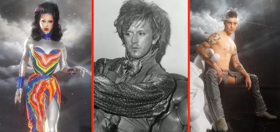 “My cousin’s name was Larry, and he was kind and beautiful and brave and worthy,” queer writer and activist Charles M. Blow (pictured) writes in the New York Times.
“My cousin’s name was Larry, and he was kind and beautiful and brave and worthy,” queer writer and activist Charles M. Blow (pictured) writes in the New York Times.
Blow is the author of the Lambda Literary Award-winning memoir Fire Shut Up In My Bones. He and his cousin Larry grew up in what he describes as a “segregated Louisiana hamlet of about a thousand people.”
Though Larry never actually came out to anyone in his family, it was assumed by most everyone that he was gay, Blow writes, “because of the way he carried himself and the fact that he didn’t date women or marry one.”
Related: Is It True What They Say About Black Men?
How about we take this to the next level?
Our newsletter is like a refreshing cocktail (or mocktail) of LGBTQ+ entertainment and pop culture, served up with a side of eye-candy.
In 1993, Larry was found tied to a bed and murdered in what appeared to be a hate crime. No one was ever charged with the killing, however, and the story went unreported.
“The gossip was that his life had been taken because of the way he had lived it,” Blow writes. “Such were the dangers of being both black and different.”
Blow continues, “Five years after [Larry] was tied to the bed and killed, Matthew Shepard, a young, white, openly gay man, was tied to a fence and killed in a small Wyoming city. While [Larry’s] death hardly made the local papers, Matthew’s provoked an international outcry. That discrepancy would haunt me.”
Related: These Queer Black Writers Deserve Your Attention
Blow suggests the reason his cousin’s murder didn’t receive much attention was because he lived an “amplified erasure,” being both black and gay in a time and place where there were few resources or almost no protection.
Twenty years later, little has changed. The most recent study by the National Coalition of Anti-Violence Programs found that nearly 80 percent of all anti-LGBTQ homicide victims in 2014 were people of color, and 60 percent African American.
“I wish that Larry had survived to see a time when the country was fighting to affirm both parts of his identity, fighting to acknowledge that his black life mattered and his love life mattered,” Blow concludes. “I wish he had lived to see more people come to understand the intersectionality of oppression — that racism and homophobia are born of the same beast.”
Related: Lee Daniels Explains Why It’s Harder For Black Men To Come Out


















notevenwrong
This op-ed appeared in the NYT a long time ago.
DonW
@notevenwrong: If a month is “a long time,” yeah, but so what? It’s certainly worth a mention and it’s not exactly time-sensitive since the murder happened more than 20 years ago.
Masc Pride
In the full op-ed, Blow says that there is only gossip about what was behind his cousin’s murder:
“You see, more than a decade after I remember him coming to the upholstery shop, he was found murdered — tied to a bed — in a neighboring town. The gossip was that his life had been taken because of the way he had lived it. To my knowledge, no one was ever charged with that murder. Such were the dangers of being both black and different.”
Matthew Shepherd’s story wasn’t just gossip, and that’s a very big difference. Blow admits he doesn’t know what happened to his cousin or if anything became of the case. Could’ve been a hook-up gone wrong. It’s a sad story, but the comparison is inaccurate and makes him look like a total r@ce-baiter.
David King
When ur gay and you read “Penis” instead of “Pens” 🙁
calabrazy
“People of color” (men) are more violent towards homosexuality. Specifically in inner cities and poor areas
Blackceo
@calabrazy:
Really? Where are your receipts on that generalization?
Anywho…Blow brings up the importance of intersectionality, which is often left out of the discussion about such topics. Some call it “oppression Olympics” when it is brought up but that is very dismissive and discounts the added layers and additional discrimination of being a member of multiple minority groups.
calabrazy
@Blackceo: it clearly says in the article that 80% of homicides are people of color, and 60% are African American. Just because I said black don’t attack me. You’ve read the writing on the wall, but you don’t see the wall
Leonard Woodrow
People are slowly becoming more educated on the subject of sexuality, but unfortunately most religious bigots are trying to stop the advance, or remaining silent.
However, as an optimist, I think enlightenment is now unstoppable, and superstitions will become a thing of the past.
Blackceo
@calabrazy:
Actually you didn’t say Black and neither did I and if you consider that an “attack” because I asked for empirical evidence then sorry for “attacking” you.
calabrazy
white lives matter. Blacks need to stop killing white people. Period
etseq
Since when is Blow “queer”? From what I know of him, he would never use that word. Hell, it took him over 40 years to admit he was bisexual and even now he admits he is still working through alot of internalized homophobia. While I appreciate his finally coming out, I question his motives and judgment by framing it in the context of child abuse which he still seems, at some level, to blame for his attraction to men. Dan Savage hasn’t helped the matter by using Blow to justify his “bi-romantic” theories that insist that there is nothing homophobic about bisexuals claiming that they are only “emotionally” attracted to the opposite sex thus reducing their same sex attractions as mere lust and same sex partners as nothing more than glorified sex toys. The more likely explanation is that homophobia and heterosexism are the reason and not some pop psychology explanation that divorces sexual attraction from love and romance.
I would also agree with commenters above who question Blow’s attempt to blame white gays for an unreported “hate crime” that even he isn’t sure had anything to do with the victims sexuality. The social justice warrior crowd loves to concoct elaborate theoretical justifications for shifting the blame for every social evil to white gay men – amazing how so called liberals will always privilege race over sexuality when it comes to assigning blame in the oppression olympics.
notevenwrong
@etsez: “…they are only “emotionally” attracted to the opposite sex thus reducing their same sex attractions as mere lust and same sex partners as nothing more than glorified sex toys.”
Thank you for putting your finger on what has been bothering me about that for a long time.
Aromaeus
@calabrazy: Did you conveniently overlook the part that says VICTIMS OF or did your r@cism just make you block that out?
1EqualityUSA
I like that Queerty is featuring a successful, gay, black man. We need more inspiring stories all around. His sentence structure resonates to my ear. “Fire Shut Up In My Bones” is my next book to read.
Etseq,
Oppression Olympics and your reasoning may be true, however, I see Charles M. Blow as a person who is healing. The journey, to a more enlightened mindset, is infinitely more rich than the end sum. This is where the test comes in as to whether or not this author can grow, overcome, and convey that in a way that teaches. Some authors get caught in a trap and tangle themselves up in the world. This man has pain and he’s writing about it. Twenty years from now, having talked it out, he may have a different perspective. We all grow up. Some overcome adversity. Your comment is true, but it carried more emotion than was needed. I have a spiritual connection with my spouse, so when you spoke of our marriages as being seen as lust, I sat up. I believe that flesh is inanimate without our Spirit. Our marriage is beyond molecules. They can’t touch that. We can convey our message without the edge of frustration or in a tone that detracts from the message.